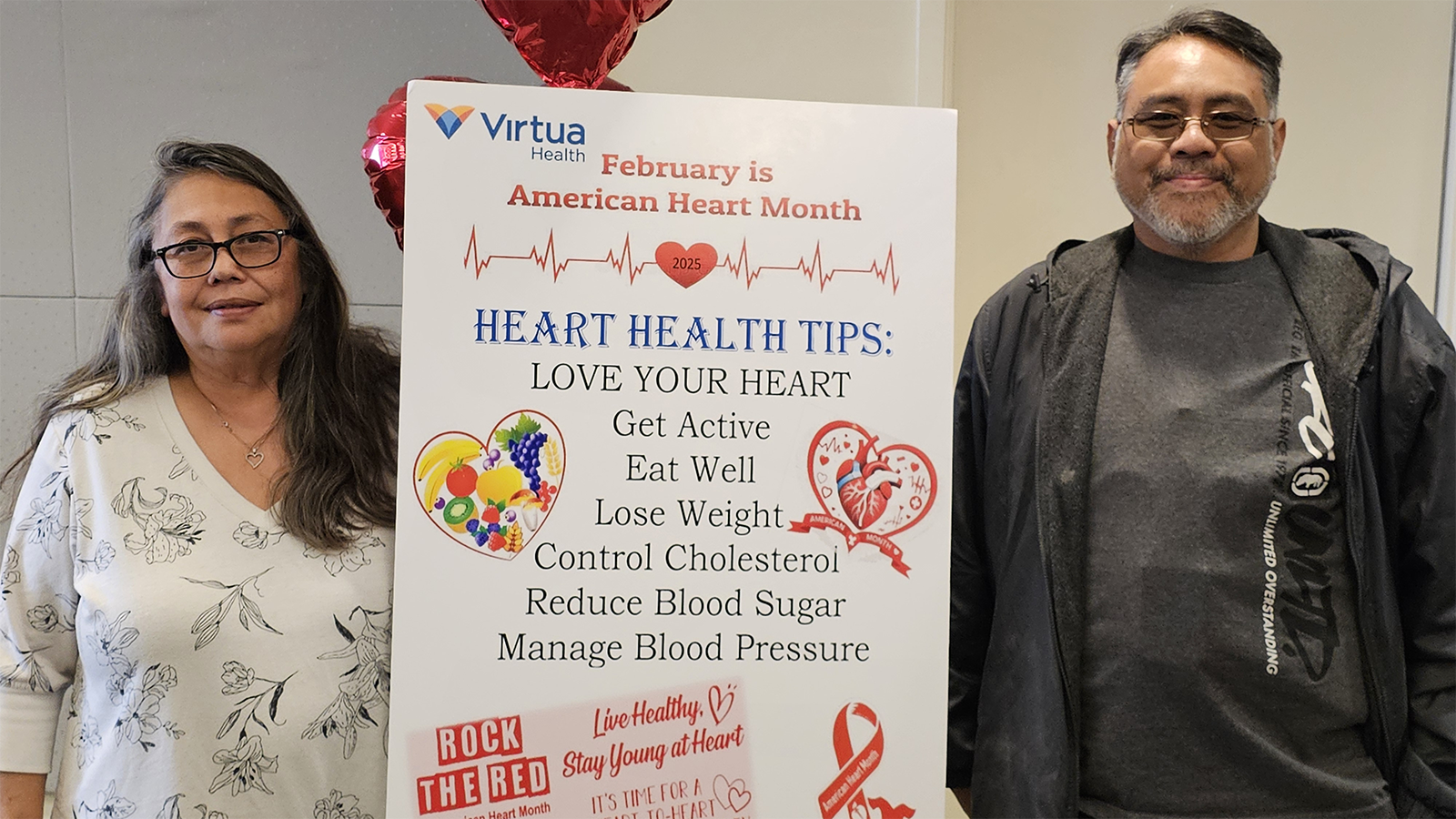In Sickness and in Health: Couples Often Share Heart Disease Risk
Couples share a lot more than romance. They often have the same behaviors and risk factors that can lead to heart disease. Cardiologist Michael Horwitz, DO, offers three ways to team up for your health.
By Michael Horwitz, DO, Cardiologist, Virtua Cardiology – Willingboro
Couples share a lot more than romance: the same values, interests, and maybe even sports teams. But they often also share the same behaviors and risk factors that can lead to cardiovascular disease.
A study published in fall 2020 in the journal JAMA Network Open looked at 5,400 U.S. couples enrolled in an employee wellness program. Researched evaluated their likelihood of developing heart disease using risk factors outlined in the American Heart Association’s Life’s Simple 7 program: smoking status, physical activity, healthy diet, total cholesterol, blood pressure, fasting blood sugar, and body mass index.
Participants then were categorized individually and as couples as poor, intermediate, or ideal for each risk factor and overall.
About 80% of couples had less-than-ideal scores for heart disease risk, primarily due to their unhealthy diets and lack of exercise.
Partner Influence
While age and family history play a role, lifestyle greatly influences whether you will actually develop heart disease. Risk factors such high blood pressure, high cholesterol, obesity, and smoking are connected to the choices we make.
Couples often share eating and exercise habits. If one partner eats fatty foods and spends evenings sitting on the couch, the other probably will, too.
But if one partner makes a habit of mainly eating fresh fruits and vegetables and going for daily walks or bike rides, those good habits can rub off on the other as well. After a while, you’ll both be in a healthy routine.
Team Up for Health
By working as a couple, both of you can lower your risk for cardiovascular disease. Try to:
- Cook more meals together. Cooking at home helps you to eat healthier and save money—and cooking is a lot more enjoyable with company in the kitchen. Focus on recipes featuring fresh fruits and vegetables, whole grains, lean meats, and low-fat dairy products.
- Make fitness-oriented plans. Aim for at least 30 minutes of daily exercise. Find activities to do together, like walking, biking, dancing, or virtual exercise classes.
- Stop smoking. One study found that when couples attended smoking cessation programs together, their odds of successfully quitting were six times higher than for people who attempted to break the habit alone.
Heart disease prevention should not focus on the individual, but instead on the entire household. If one person has an increased risk, other members of the family likely do as well. Having that family support system, where everyone benefits from the changes in diet and exercise, can really make a difference.
Comprehensive Heart Care Near You
Looking for a cardiologist? Get an appointment with a Virtua heart specialist within 48 hours. Call 888-847-8823
There's So Much More to Explore
Discover expert insights, inspiring stories, health tips, and more by exploring the content below!

How the Unique Stages of a Woman's Heart Affect Her Health

Complex Aortic Surgery Provides Lu’Shell Hope for the Future

HeartTalk Magazine

Are You Eating Too Much Salt? High-Sodium Foods to Watch For

4 Exercise Tips to Help You Reverse High Blood Pressure

Timely Heart Care During a Heart Attack Helps Joe Feed the Community

3 Reasons Why Now's the Time to Find Relief From Varicose Veins

Lifesaving Heart Care Creates a 'Bond That's Never Left Us'

How High Blood Pressure Affects Your Body

5 Interesting Facts About Your Heart

Get to the Bottom of Blood Pressure Numbers

CABG Surgery: What Women Should Know About Heart Health and Healing

When to Take Action for a Stronger Heart

Groundbreaking Renal Denervation Procedure Controls a Lifetime of High Blood Pressure

Patient Story: LVAD Mechanical Pump Strengthens Michael's Heart Function

Mitral Valve Surgery Keeps Yaneth Living the American Dream
Inside Look at Blood Vessels Aids PAD Treatment
Denise Davis: Pay Attention to Your Heart Health

Sweet Music: Trust, Teamwork Save Justin from Heart Attack

Complex Heart Surgery Nets James a Lifelong Friend

8 Key Steps to Better Blood Pressure Control

Signs You Should Get Treated For Vein Problems

One New Heart Valve Saves Two Lives in the Tritten Family

What You Need to Know About Heart Failure

6 Numbers Key to Keeping Your Heart Healthy

Five Mindfulness Tips That Can Help Heal Your Heart

Watchman Heart Device: a Technological Breakthrough for Blood Clot Prevention

Albert's Emergency Cardiac Surgery Is a 'Story of a Lifetime'

Love Your Heart: Essential Care Tips for Every Stage of Life

How Do I Measure My Blood Pressure at Home?

How Do I Improve My Cholesterol Levels?

3 Ways to Reduce Your Stroke Risk

Can Your Gut Health Affect Your Heart?
Advanced Heart Failure Therapies Get Bernadine Back to Full Speed

Keeping the Beat: Advanced Heart Surgery for Aortic Aneurysm

Heart-Healthy Summer Recipe: Hummus and Veggies

4 Delicious Heart-Healthy Recipes Perfect for Summer

Heart Healthy Summer Recipe: Dessert Parfait

Heart-Healthy Summer Recipe: Pear and Walnut Salad

Heart-Healthy Summer Recipe: Terrific Turkey Burgers
Atrial Fibrillation and Stroke: What's the Connection?
Heart Tests Your Doctor May Order
Managing Pregnancy for Mothers With Heart Conditions

Heart Healthy Recipe: Basil Pesto Pasta With Seared Vegetables

Heart Healthy Recipe Chocolate Avocado Chia Pudding
Keep Your Heart Rhythm in Check With Your Smartwatch
Mind Your Meds for Blood Pressure Risks
Magic Pill for Heart Health? Cut 300 Calories a Day
3 Smart Ways to Boost Your Heart Health
3 Best Exercises For Heart Health

Get Your Heart Pumping With These 25 Workout Songs
Your Chest Pain: Heartburn, Heart Attack, or Something Else?
3 Heart Healthy Recipes to Win Valentines Day
How Work and Home Stress Can Affect You
Why Improving Your Health Is Going To The Dogs And Cats
Why Younger Women Need Start NOW To Safeguard Their Hearts From Heart Attacks
Can You Die of a Broken Heart?
Mitral Valve Surgery Opens Doors for Improved Quality of Life
6 Healthy Habits to Start in Your 20s for Better Lifelong Health
Do You Have a Fatty Heart?
Get Pumped! Assist Devices Can Improve Heart Failure Symptoms
A Cardiologists Advice on Heart-saving Emergency Cardiac Care
Virtua Doctor’s Experience Is a Warning for All About COVID-19 and Strokes
You May Feel Fine, but Gregory Says "Don't Skip Your Medical Care"
In Sickness and in Health: Couples Often Share Heart Disease Risk
"Reduce Your Heart Disease Risk With a Plant-based Diet"
Hybrid Robotic Heart Surgery and Valve Replacement Restores Quality of Life
Can Marijuana Hurt Your Heart Health?
6 Tips for Restoring Your Heart Rhythm
Eat Smart for Your Heart
Cardiac Rehab: Strengthening Your Heart After Leaving the Hospital
Your Heart Needs A Good Nights Sleep
Are You at Risk for AAA—the Silent Killer?
The Cardio Oncology Team Protects Your Heart During Cancer Treatment
Get Relief From Painful Varicose Veins This Summer
Exercise Your Way to a Stronger Heart
Fish Oil: A Good Catch or a Scam?
My Heart Seems to Skip a Beat - Should I Be Worried?
Menu Planning? Try These 5 Heart-smart Substitutions

5 Health Risks Tied to Weight

